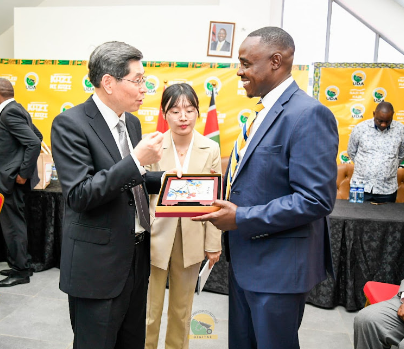The United Democratic Alliance (UDA) is currently embroiled in factional conflicts as it prepares for crucial constituency elections scheduled for Friday.
These elections, taking place in Nairobi, Narok, West Pokot, Homa Bay, and Busia, mark a significant moment for registered party members to select their officials at the constituency level, following last week’s ward elections.
The upcoming polls have heightened tensions within UDA, particularly among top leaders, who are at odds over various issues surrounding the elections. Deputy President Rigathi Gachagua recently shed light on the internal strife within the party, accusing some politicians from the Rift Valley region of meddling in the Mt Kenya region’s grassroots elections.
Gachagua alleged that these Rift Valley politicians are attempting to influence the UDA grassroots elections in his Mt Kenya stronghold with the aim of swaying support in the region and undermining his influence.
The DP’s claims highlight the complexities and power struggles within UDA as it navigates the dynamics of regional politics and internal party dynamics.
As the constituency elections approach, the spotlight remains on UDA, with observers closely monitoring the outcome of these polls and the implications for the party’s future direction and cohesion.
“Some few politicians who are around the president want to meddle with Mt Kenya politics to fight me. We in Mt Kenya have never interfered with Rift Valley politics and we deserve respect,” Gachagua said on Saturday in Uasin Gishu.
Gachagua criticized a section of leaders from Rift Valley whom he questioned their source of money saying they have been hopping from one area to another using helicopters to dish monies.
Gachagua did not mention any name and asked MPs to stick to their constituencies and stop political tourism.
“Where are these resources coming from, for politicking, when Kenyans are suffering? Choppers are being hired left, right and centre. Millions of shillings are being dished and Kenyans are suffering,” Gachagua said during a fundraiser in support of a women empowerment programme in Kesses, Uasin Gishu on Saturday.
“I urge the MPs to stay in their Constituency and serve their people. The habit of political tourism must stop. This is what is giving us trouble.”
The DP’s remarks sparked furious reactions from some Rift Valley politicians who alleged that Gachagua was unhappy with their frequent countrywide tours.
Kapseret MP Oscar Sudi maintained that he will not stop crisscrossing the country to support vulnerable groups and churches in development matters.
“Yesterday (Saturday), I saw a team of leaders in Kesses saying someone is causing a rift here and there. If you say Sudi should not leave his constituency and at the time you are talking you are in another constituency with about 30 MPs, is that not a contradiction)?” Sudi said without mentioning names.
“All those who were in Kesses used choppers to make themselves popular when we were in opposition until they clinched power. If you do not want to crisscross the country then stay home. Look for someone else to intimidate, I am past that stage.”
The internal dynamics of the United Democratic Alliance (UDA) party are becoming increasingly complex as key leaders vie for positions and influence ahead of the all-important constituency elections.
Political maneuvers and allegiances within the party have intensified, with various factions jostling for control at both the constituency and county levels.
One notable development is the emergence of Kiharu MP Ndindi Nyoro as a potential running mate for Deputy President William Ruto in the 2027 presidential race.
Nyoro’s active engagement in fundraising activities and his widespread presence across the country have fueled speculation about his ambitions for higher office and his desire to consolidate loyalists within key party positions.
However, Deputy President Rigathi Gachagua has been accused of feeling threatened by Nyoro’s growing influence, leading to tensions within the party.
Gachagua and his allies have been vocal in their support for Ruto and have emphasized unity within the UDA ranks.
The involvement of Kirinyaga Governor Anne Waiguru in the internal UDA discourse further underscores the depth of the party’s internal divisions. Waiguru’s remarks, advocating for inclusivity and the recognition of women and youth in leadership positions, can be interpreted as a subtle rebuke of Gachagua’s approach.
As the constituency elections draw near, the stakes are high for politicians seeking to secure positions at both the constituency and county levels.
Winning constituency elections is seen as crucial for enhancing one’s prospects of securing UDA tickets for county-level positions in the 2027 elections.
In various counties such as Nairobi, Narok, and West Pokot, key figures are gearing up for intense battles for party positions, with the outcome of these elections likely to shape the future direction of UDA’s leadership and influence.
The internal power struggles within UDA underscore the complex dynamics at play as the party seeks to consolidate its political foothold and prepare for future electoral contests.



